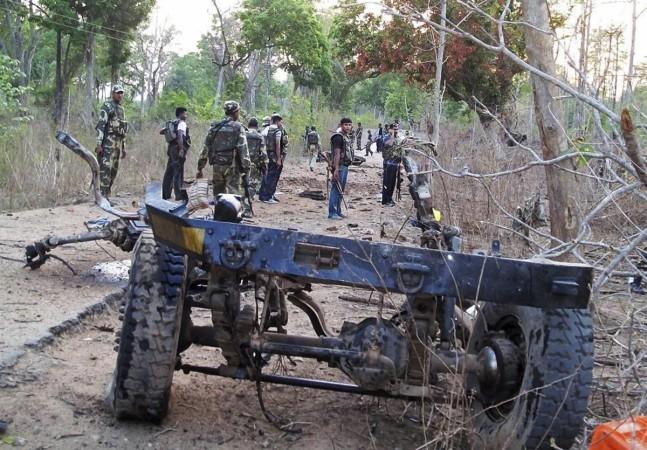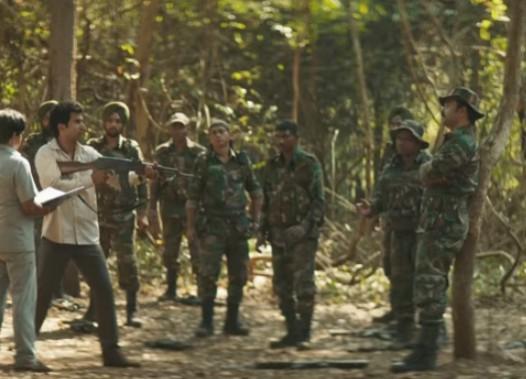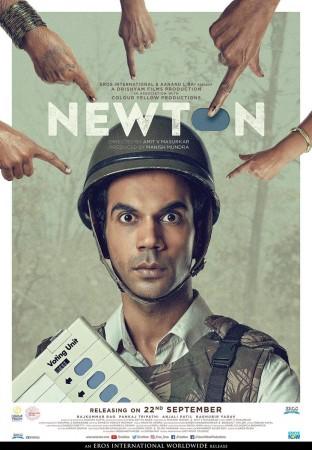
After watching the Hindi movie 'Newton', a feeling of extreme depression can hit the viewer. That in our country today there are pockets of extreme backwardness where the situation is almost unsurmountable -- places like Chattisgarh where violence and poverty stalk each other. Can one Newton change anything?
Dantewada, Sukma, Aranyakanda, Bastar... many of us may not even know these places belong to the heavily forested state of Chattisgarh carved out of Madhya Pradesh and formed in 2000.
Now, thanks to a Hindi film the place has become famous. Or rather, infamous.
Amit Masurkar's 'Newton' will be India's entry for the Oscar. Suffice it to say the film is eminently placed for international recognition, as proved at the Berlin film fest. Depicting an election day in one of the remote areas of Chattisgarh, it throws up both despair and hope. Even one naive, honest election officer can make a difference is the message the story delivers, even as it throws up uncomfortable questions.
A security force under constant threat of attack from the rebels can perhaps be excused for not wanting to take risk with lives for a few votes from ignorant, uneducated tribals living deep in the forest. Atma Singh, the head of the security force deputed to escort election officials, cannot appreciate presiding officer Nutan Kumar alias Newton's insistence on going by the rule book. He would rather round up a few of his men to do the proxy voting. Reality check!
Recent headlines reveal the number of lives lost in the clash between naxals and security forces. Sukma, Dantewada, and so on. With sophisticated weaponry including AK-47, rocket launchers and landmines, and an information system penetrating most villages, the naxals seem to dominate the battle. Even when the security force is informed of an attack, they become handicapped owing to the human shield the rebels use in the form of tribal folks.
According to the Chhattisgarh police, the naxals collected almost Rs 2,000 crore in 2009 as revenue through extortion from corporates, businessmen and illegal operators in the mines, etc. The naxals also threaten the locals from participating in any democratic process like polls.
As a result, for casting vote the tribals have to be rounded up, like Atma Singh's men do in the film. Alongside this hustling, in a parody we see a woman running after a hen to catch and cook the hapless bird for the police and poll officers.
Finally, when some numbers have been brought along, Newton is vexed to find the lot have no idea of the candidates or their promises. From an innocent query on how much money they will be paid for voting, to picking a random name from the list, it is a telling indicator of the significance of voting in this back of beyond.
The destruction of a school in the middle of the forest, the assurance that the inhabitants are safe in a camp, the final ploy employed to bring an end to a meaningless wait for voters sure not to come, everything points to a system that has accepted certain hard facts and would rather not disturb the status quo.

Strategies to tackle the naxals have varied from the centre's call for "aggression in policy and strategy" to the state chief minister's suggestion for raising a 'Dandakaranya' battalion like the Naga regiment to encourage tribal youths from Maoist-hit Bastar to join the armed forces. There have also been the calls for aggression in development, with road construction seen as a vital component.
Roads will improve access and make it easy for the security forces to operate as well as to forge development of one of the most backward states of the country. However, the naxals have been wise to this fact and have increased their attacks on the under-construction roads.
With 44 percent of its total land area classified as forests and another 10 percent deemed to be forests as per revenue records, Chhattisgarh is one of the country's most forested state. Collection of tendu leaves, seeds, medicinal herbs, nuts and fruits continue to be the livelihood of its tribal population. While the Scheduled Tribes, Scheduled Castes, Backward Classes and Minorities make up nearly 75 percent of the population, the Scheduled Tribes alone form about 31 percent of the total population. They live largely in the forests and are largely backward.
Things are changing but slowly. In the movie, one of the booth officers is a tribal woman from the region. Another scene shows two of the security forces, presumably tribals, pilfering from abandoned items in the rundown habitation.
In the words of one of its former chief Secretaries, P Joy Oomen, the state continues to be relatively backward compared to other states, thanks to the "policy of benevolent isolation of the tribals followed by central and state governments."
In the book, 'In the rear view mirror' revolving around reflections of Chief Secretaries, brought out by Public Affairs Centre, Bangalore, he writes how this isolation with good intentions was slowly eroded in the 90s when traders, money lenders, NGOs and the naxals moved in.
Given its rich mineral and agricultural wealth, the government is keen to develop the state. But by early 2000, however, it became almost impossible to make any developmental efforts as most of the interior villages were controlled by Naxalites, says Oomen. Despite this, some services have continued to reach these areas too, he adds, pointing to the robust public distribution system operating in the tribal areas.

Pointing to the troublesome period in the state's infancy, during 2005-07 period, he refers to large number of camps set up by the government to give shelter to villagers fleeing naxal violence. These camps too were targeted and hundreds of villagers massacred by the rebels, he says, pointing to biased stories by intellectuals, writers and civil rights activists "who have been consistently blind to the rampant and brutal violence of the LEM (left extremist movement)" while criticising the government and ignoring the valiant efforts made by young officers to spread education and health care in remote areas of the State against all odds.
He goes on to detail some initiatives taken by the administration to educate tribal students from naxal affected districts of Bastar. Thanks to a special school with coaching facilities for IIT JEE, state PET and other competitive examinations, a record 210 students belonging to scheduled tribes got admitted to leading engineering colleges in the country including two to IITs and over 100 to NITs.
The special school named 'Prayas' has now been replicated to include more students belonging to both scheduled tribes and castes from all parts of Chhattisgarh.
Why does popular media only focus on the negatives? Why is the story of Prayas unheard of, while stories of atrocities by the forces drilled regularly into the public consciousness?
The film has been shot in the jungles of Chattisgarh and many of the 'actors' in the film are tribals from the place. The yawning chasm between modern India and the backward region is more than evident in their visage and settlements. Isolation is no more the answer with the tribals connected to the market economy. It is time for all involved to work for a positive change that uplifts their standard of life and defeats the extremist movement.
In the movie, the tribal officer tells the honest, persevering protagonist that things take time to change, but change they will. It may begin with a lone Newton, or one Prayas, battling it out. The winds of change can gain momentum from a breeze to a gale in no time, if the conditions in the atmosphere are conducive.








!['Lip lock, pressure, pyaar': Vidya Balan- Pratik Gandhi shine in non-judgmental infidelity romcom Do Aur Do Pyaar [ Review]](https://data1.ibtimes.co.in/en/full/797104/lip-lock-pressure-pyaar-vidya-balan-pratik-gandhi-shine-non-judgmental-infidelity-romcom.jpg?w=220&h=138)








